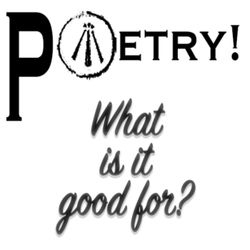Latest episode
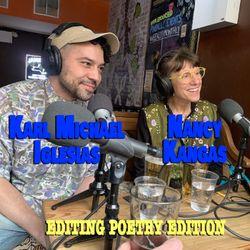
18. Nancy Kangas & Karl M. Iglesias on Editing Poems
54:50||Season 2, Ep. 18I had a wonderful conversation with poet and creative Nancy Kangas at her "Emergency Poetry Clinic in Red Hook Brooklyn -- See PGF #17 -- and wanted more. And so -- Nancy invited her poet-friend Karl Michael Iglesias and we sat down in the pinball loft of Gebhard's Beer Culture Bar with PGF co-host Chris Brandt to talk about the work of editing a poem. A fun adventure through the creative minds of two poets who enjoy each other's work.Poetry Good For is a podcast produced by BCR Podcast.
More episodes
View all episodes
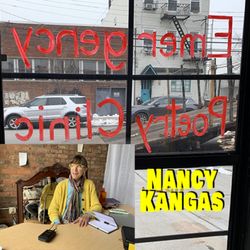
17. Nancy's Emergency Poetry Clinic
30:04||Season 2, Ep. 17Our producer – Alina Larson – told us about Nancy Kangas’s Emergency Poetry Clinic in Red Hook, Brooklyn. It seemed clear to me that America needs an emergency poetry clinic; I wanted to see what that was about. and so on a recent Tuesday morning I took a subway and a bus and a walk to 166 Van Dyke Street, Brooklyn. Earlier that morning I looked up “Nancy Kangas” and discovered a creative who defies categorization – Nancy K rides the wind of her whims.I arrived at 10:17am -- Ms. K was ensconced on the other side of a store front window in a tiny, colorful -- Thru the Looking Glass -- office.Nancy Kangas and her poet friend Karl Michael Iglesias will be on Poetry Good For podcast in the very near future.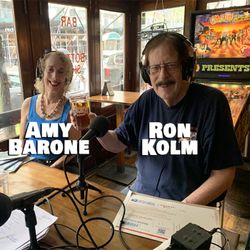
16. Bicycles & Book Stores: Amy Barone & Ron Kolm
51:48||Season 2, Ep. 16Back at our usual poetry-reading haunt -- Gebhard's Beer Culture Bar -- Chris Brandt, Rebecca McKean and Alan Winson talk with poets Amy Barone and Ron Kolm -- about:Extinction / Gambling with God / Men's love of their penes / COVID / Bison comeback / Book thieves and Ceiling stompers / Suicide and Attempted suicide / and -- of course -- A child's bicycle. Can you resist?CONTACT: barcrawlradio@gmail.com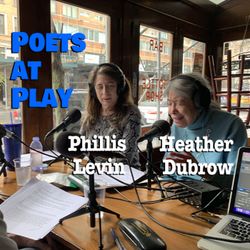
15. Poetry as Play with Phillis Levin & Heather Dubrow
55:24||Season 2, Ep. 15Phillis Levin’s poems have appeared in the New Yorker, the Atlantic, Poetry magazine, Kenyon Review, among others, she has also published 5 collections of poems, and edited the sonnet anthology. She has taught at The University of Maryland, the Unterberg Poetry Center, the New School, and New York University, and currently is professor of English and poet-in-residence at Hofstra University. Among her honors are the Amy Lowell Traveling Scholarship and a residency at the American Academy in Rome Heather Dubrow holds the John D. Boyd Chair in the Poetic Imagination at Fordham; she specializes in early modern lyric poetry and Shakespeare. She also taught at the University of Wisconsin. Faced with the academic profession’s stigma that scholars should not be creative writers, Dubrow had given up writing poetry for twenty years, but returned to poetry in the 1990s. She has published two chapbooks and two collections. Among the journals where her poetry has appeared are Prairie Schooner, Southern Review, Virginia Quarterly Review, and The Yale Review. She was co-director of Fordham's Poets Out Loud public reading series from Fall 2009 to Summer 2020.CORRECTION: Chris gave the wrong date for the publication of Phillis Levin's newest poetry book. An Anthology of Rain will be available after April 15, 2025.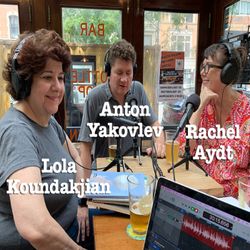
14. Poetry Readings Abide!
56:17||Season 1, Ep. 14It has been awhile since we have posted a "Poetry! What Is It Good For" episode. And this one was not done on Zoom but with the living poets before us at Gebhard's Beer Culture Bar on Manhattan's Upper West Side. For this conversation we talked about running live poetry readings with three poets and organizers: Anton Yakovlev is a well-published poet born in Moscow, Russia; he co-hosts the Carmine Street Metrics poetry reading series. We first heard about Lola Koundakjian when she hosted the World Poetry Movement's "For a World Without Walls" global poetry reading event. Lola heads up the Dead Armenian Poetry Society. And, Rachel Aydt has moved from writing poetry to short stories; she formerly co-hosted the Crystal Radio Sessions poetry reading series at a local UWS bar.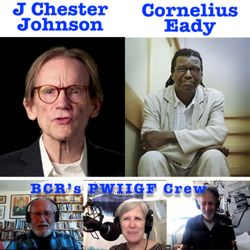
13. 9/11: 2001 - 2021
01:04:13||Season 1, Ep. 13The Poetry Foundation editors write: “When major parts of our lives seem to change in a flash, we are reminded that poetry can help us to cope with new realities and to assess the unknowns ahead. When we are stepping out into uncharted terrain, alone or together, poetry can capture our emotions. It can share our vulnerabilities and scars, along with our strengths.”Today. we are sharing the first program of our new podcast co-produced with Chris Brandt -- “Poetry. What is it good for?” For this first episode, we explored the 20-year social and emotional after-tremors of the attack by Saudi Arabian terrorists on the United States through the powerful tool of poetry with J. Chester Johnson and Cornelius Eady. J. Chester Johnson is a poet, playwright, essayist, translator, speaker and teacher. He visited Bar Crawl Radio a couple of months ago to talk about his book – “Damaged Heritage” -- on the history and his family’s connection with the 1919 Elaine, Arkansas Massacre, one of many human crimes against humanity in which U. S. White citizens killed over 100 U.S. Black citizens and then prosecuted the survivors for their act of murder. Though Cornelius Eady, an American poet, focuses on issues of race and society, his verse accomplishes a lot more as indicated in his deeply felt reactions to the 9/11 attack on this country. Cornelius is also a musician whose verse is performed as song by The Cornelius Eady Trio. His poetry is simple and accessible, centering on jazz and blues, family life, violence, and society from a racial and class-based POV.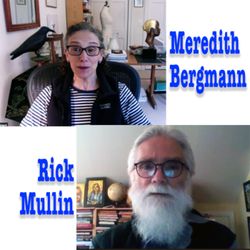
12. Bergmann & Mullin: 2 Poets :: 1 Sculptor / 1 Painter
01:02:27||Season 1, Ep. 12PWIIGF podcast brings together two poets who have something in common read and talk about their work. For this episode we consider how word, image and mass interact within the creative artist. Rick Mullin’s poetry has been published in many journals and anthologies, including The Dark Horse, American Arts Quarterly, The New Criterion, and Rabbit Ears:TV Poems. His collection “Lullaby and Wheel,” was published in 2019 by Kelsay Books. When he was in his mid-30s Rick visited the LosAngeles County Museum of Art and encountered paintings by Matisse, Braque and other Fauve artists that changed his life and he began to paint. Later, hebecame fascinated with the painter Chaim Soutine and wrote a biography of Soutine in poetry form. Thank you, Rick for joining us. Sculptor Meredith Bergmann creates public monuments exploring issues of history, social justice, race, human rights, disabilities, and the power of poetry andmusic. Bergmann’s work is well known in New York City for the FDR Hope Memorial on Roosevelt Island unveiled in 2019 – the September11th Memorial in Cathedral of St. John the Divine in 2012 – and most recently the “Women’s Rights Pioneers Monument” in Central Park. MeredithBergmann is also an accomplished poet and poetry critic -- her writing has appeared in Contemporary Poetry, Hudson Review and The New Criterion and she was poetry editor of The American Arts Quarterly from 2006 - 2017
